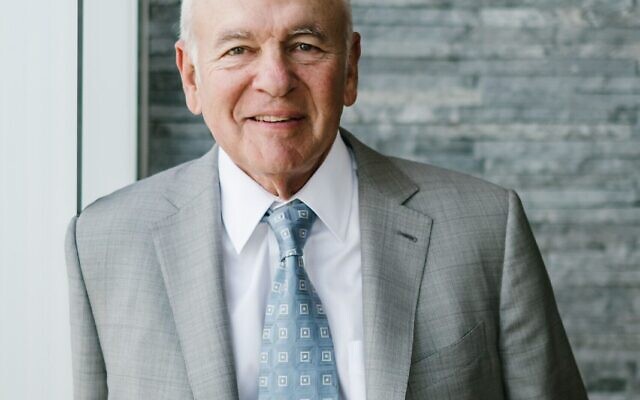Promising Forecasts for Atlanta Commercial Real Estate
Four prominent Jewish Atlantans share their thoughts, forecasts, and reflections on the commercial real estate market.
Robyn Spizman Gerson is a New York Times best-selling author of many books, including “When Words Matter Most.” She is also a communications professional and well-known media personality, having appeared often locally on “Atlanta and Company” and nationally on NBC’s “Today” show. For more information go to www.robynspizman.com.
As the landscape of real estate continues to shift, the future of the Atlanta commercial market has been the subject of much debate. The AJT spoke to four well-known commercial real estate experts to get their thoughts, forecasts, and reflections on the industry.
Steve Selig, president and chairman of the board of Selig Enterprises, a pillar of the commercial real estate community said, “My grandfather Ben Massell started the family-owned company in 1918 and we are now over a hundred years old. My sister Cathy Selig Kuranoff, her son Greg Lewis, and my daughter Mindy work together in our family business. My son Scott was an integral part of our company until his untimely death almost four years ago. Atlanta is such a great city to be in and an excellent place for real estate today. The thing that is driving a lot of companies to our city is diversity. Businesses want to go where the talent is and Atlanta is not only diverse, but it also has other important advantages. Atlanta offers a lower cost of living, great weather, a highly educated workforce, and a business-friendly climate. Our transportation network is appealing, with three interstates and parallel runways at the Atlanta airport. There’s a lot of energy here.”

When it comes to new office space, Selig says his company is focusing on Midtown. “Our assessment is that companies are putting their offices where they have the best advantage to recruit and retain Atlanta’s top employees, who want to live in a place that is eclectic, active and has a community feel. We are completing a 700,000-sq.-ft. office building in the heart of Midtown, which is fully leased to two companies, prominent law firm Smith, Gambrell & Russell and tech giant Google. Midtown makes up only 15% of the greater Atlanta office market, but, in the last five years, has realized over 50% of the Atlanta region’s absorption. In addition to being bullish on Midtown’s core market, we are equally optimistic on West Midtown, where we are developing ‘The Works,’ which was my son Scott’s vision, and includes a beautiful park named in his memory. It will be an 80-acre adaptive re-use development in the heart of Atlanta’s Upper Westside, and include retail, dining, office space, residential, and greenspace.”
Younger generations have different priorities around work-life balance, and that’s driving new trends. “Young people used to find the job and then look for a place to live,” Selig reflected. “Now they choose where they wish to live and then find a job. Atlanta has racial diversity and particularly, because of the Atlanta University Systems, it has one of the highest concentrations of educated, diverse talent in the country. High tech companies looking to diversify their workforce realize there isn’t a better city in which to do so. We also own a lot of retail, and that sector has been robust particularly in Buckhead. Although regional malls have become quite vulnerable, the neighborhood centers we focus on all around the city are doing very well. As the pandemic is drawing to an end, we have observed a robust increase in demand for these lifestyle centers.”
Relationships with the community are also important. Selig says he wants to see more individual stores that serve the community and build trust over time. “We are aware that we are dealing with someone who lives in the neighborhood, which impacts our decision-making,” he said. “I continue to be very excited about the commercial real estate scene here, as Atlanta has such a vibrancy about it. Yes, we have issues that must be solved, and I think they will be, but I’m clearly bullish on Atlanta. We’re developing quality projects and have a very strong team of employees. Our portfolio is diversified and includes office, retail, industrial and residential, and Selig Enterprises is proud to live, work and be headquartered in Atlanta.”

Jack Halpern, chairman and CEO of Halpern Enterprises, said: “There is a lot of money bidding up the price of real estate these days, because there are not too many attractive alternative places to invest. That has been partly because of the pandemic, but also a result of the slowdown in new housing construction that has occurred in recent years. Demand has exceeded the supply, so the price of real estate has increased.”
There have also been fundamental shifts in consumer shopping and buying habits, Halpern said, partially due to COVID-19, but also due to the convenience of shopping online.
“The internet has made it easy to shop from home, which has certainly had a big impact on retail stores — particularly those located in enclosed malls. People no longer look at shopping as a fun recreational activity and are more interested in getting what they want or need as quickly as possible. That cultural shift, along with the consolidation that has taken place among retailers and the ‘category killing’ impact of big box stores, means that there are fewer opportunities out there for mom-and-pop retailers to find a niche and be successful.”
Halpern added, “To those of us in the real estate business, the biggest impact of these changes has been how our mix of tenants has evolved over time. Grocery stores are doing more business than ever because of the shift to eating at home, which was also a reaction to COVID. In addition, there are certain things that can’t be purchased over the internet. We have seen an increase in demand for space from service-related businesses, like physical therapists, nail salons, and hair salons. Restaurants had a tough time last year, and a lot of them did go out of business, but people are cautiously going out to eat again. Those who became efficient at filling take-out orders and offering outdoor seating have tended to survive and are now doing well.”
But there are always winners and losers, and last year was particularly challenging for many retailers, he said. “Our goal as a landlord was to keep as many of our tenants in business as possible, and for the most part we were successful. We were willing to be flexible and defer some rent payments, on a case-by-case basis, and that helped a number of our tenants to make it through the difficult times. As a result, our occupancy today is actually better than it was before the pandemic.”

Scott Horowitz has been active in the Atlanta commercial real estate industry since 1992, with some 450 lease or purchase transactions totaling more than $400 million under his belt. His strength is representing companies looking to lease or purchase warehouse space to store and distribute goods. He said, “The market was strong prior to COVID-19, but the pandemic accelerated the expansion of e-commerce based on the consumer learning the efficiency of online ordering. Companies like Amazon, Home Depot, Lowe’s and Wal-Mart continue to need smaller distribution centers close to the perimeter to deliver goods more efficiently to the customer. Atlanta has grown to be a top 10 industrial market in the country, based on our demographics and interstate system. Industrial developers continue to acquire land to keep up with tenant demand and have developed more than 20 million sq. ft. in the past several years.”
He thinks Atlanta’s low business costs, abundance of labor, and access to ports make it a national distribution hub, “which is the impetus behind our current bull market.”

Matt Shulman, CEO of The Ardent Companies, a dynamic asset management firm, said, “Our team of nearly 50 professionals manages over $1.5 billion on behalf of our investors. With headquarters in Buckhead’s Piedmont Center, and additional offices in Charlotte, New York City, and London, our presence allows for us to not only have a local or regional lens on the pandemic’s impact on the real estate market, but also a global one.”
The pandemic has been driving people to explore intimate locations, he said. “It has advanced the trends in office and retail to an experience driven by quality amenities, spaces, health and wellness, and of course, food. People no longer want to feel part of the masses. Instead, they want to have a connection to the outside world, while, interestingly enough, they are not willing to sacrifice convenience. Employers and retailers have to compete with Zoom and Amazon to get people out of their homes. This not only adds pressure to real estate companies, but also to an individual company’s ability to bring its employees back to the office. Offering an option to work remote or in the office, Ardent have enjoyed seeing the great majority of our employees returning to the office for a few months now, but frankly the bar has been lifted with flexibility and remote working now competing with the benefits of collaboration and face-to-face encounters. This dynamic is creating a friction that we believe is not only healthy but will also allow for landlords willing to work with their tenants to be at an advantage in a changing world.”
Shulman noted that “on the housing front, money continues to pour into single family homes, both for sale and for rent, as shelter continues to be an essential focus. After years of undersupply, developers are actively pursuing new projects to meet the demand.”
“Atlanta will continue to see tremendous migration due to job growth,” he predicted, impacting “both the housing and office markets. We are thrilled to share that after five years of work and four separate closings, the Piedmont Center campus is now under one ownership. Sole ownership of the 45-acre, 2.2-million-sq.-ft. office assemblage on Piedmont Road, between Lenox Road and Roswell Road, allows us to transform a once sleepy run-of-the-mill office park into a top-quality office experience with a full scope of amenities that are unparalleled in Buckhead or other parts of Atlanta. The initial phase of repositioning focuses on continued improvement of common areas and green space, as well as the creation of best-in-class conference areas. Conference facilities along with flexible spaces and terms are at the top of many tenants’ priorities, and we aim to meet these tenant needs. Healthy living and a safe environment are also top priorities, and therefore we are doubling down on the property’s green spaces, access to the outdoors, 1.2-mile walking trail, connection to Path 400, and various workout facilities.”
Shulman predicts that demand for space will only increase, as Atlanta continues to grow as a dining destination, home to talented chefs with innovative ideas.
“We are excited to be sharing our visions with them to meet their creative goals,” he said. “To be a real estate investor, one has to be an optimist with a very cautious lens. There will be lingering headwinds caused by the pandemic in office and retail, but we believe that a quality local economy and talented investors are up to the challenge.”
- Robyn Spizman Gerson
- real estate
- Steve Selig
- Jack Halpern
- Matt Shulman
- Scott Horowitz
- Scott Selig
- Ben Massell
- Cathy Selig Kuranoff
- Greg Lewis
- Mindy Selig
- family business
- Smith Gambrell & Russell
- Home Depot
- Amazon
- Wal-Mart
- The Ardent Companies
- Selig Enterprises
- Halpern Enterprises
- Midtown
- Commercial Real Estate
- Atlanta
- Upper Westside
- Retail
- Dining
- pandemic
- COVID-19
- Office
- demand
- Internet
- trends
- shopping online
- Restaurants
- Buckhead
- Piedmont Center
- New York City
- London
- Charlotte
- Business
- Zoom
- employees
- housing
- Shelter
- Migration
- tenants
- Investment
- developers
- Economy
- healthy living
- lifestyle centers
- office space
- residential
- greenspace
- Atlanta University Systems
- racial diversity
- WorkForce
- High tech companies
- Relationships
- Community
- Invest
- cultural shift
- Grocery stores
- COVID
- service-related businesses
- physical therapists
- nail salons
- hair salons
- take-out orders
- offering outdoor seating
- Landlord




comments